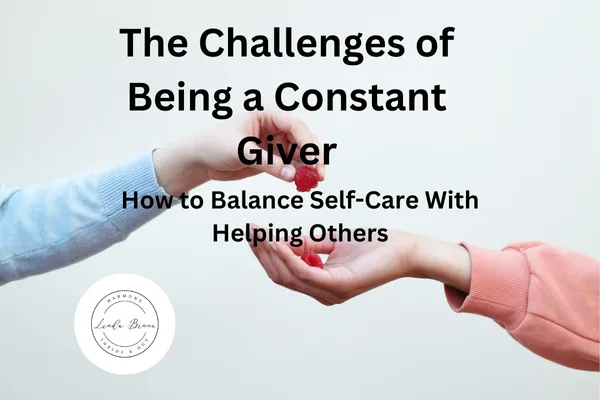BLOG
HOME /BLOG

The Challenges of Being a Constant Giver: How to Balance Self-Care with Helping Others
“Passive people pleasers avoid causing emotional discomfort in others at the expense of themselves and can end up in relationships and life situations that cause them a lot of distress and unhappiness.”
- Anne Reilly, Relationship Counsellor & Psychotherapist
Introduction:
Are you a natural helper, always ready to advocate for others, yet find your efforts often go unappreciated?
It might look like you have everything together, but I know the struggle—because I've been there too. The more you give, the harder it can be to take care of yourself. You might even feel resentful, guilty, or ashamed for feeling this way.
Let's explore how to achieve a healthier balance.

The Paradox of Giving
Giving to others is inherently rewarding, but when it comes at the expense of your own needs, it will lead to an unhealthy imbalance. Here’s what can happen when you’re always the one giving:
Unsolicited Help: You may offer advice or support that isn't asked for, leading others to feel controlled rather than supported.
Self-Worth Issues: If your value is tied solely to what you do for others, it can create an unhealthy, compulsive need to be helpful.
Fear of Inadequacy: Constantly worrying that you’re not doing enough will diminish your sense of self-worth.
Feeling Used: It’s easy to feel that others take your efforts for granted, especially if they rarely acknowledge your needs.
Feeling Responsible: You can get to the point where you feel responsible for everyone else, sometimes more responsible than they are for themselves!
I speak from personal experience. This was my story, until I learned the lesson that we teach people how to treat us. The more I gave, the more others expected it or dumped what they didn’t want to do onto me, knowing I would take care of it.
My needs were ignored by others because I ignored them myself. Once I started to change, my experiences started to change until I was able to use my natural helper abilities in the healthiest of ways.
The Challenges of Self-Care for Givers
It’s common for constant givers to overlook their own needs. Here's why self-care is often neglected and why it’s essential:
Perceived Selfishness: You might worry that focusing on yourself is selfish.
Guilt and Shame: There's a false belief that putting yourself first is wrong.
Lack of Time: Always helping others can leave little time for yourself.
Effects of Neglecting Self-Care:
Burnout: Without self-care, your "energy bank" depletes, leading to exhaustion.
Resentment: Feeling unreciprocated support can breed resentment.
Disconnection: You may lose touch with your own needs and desires.
Stress and Health Issues: Chronic neglect can lead to stress, anxiety, and health problems.
Strategies for Balanced Giving
To maintain your well-being while helping others, consider these actionable tips:
Wait for an Invitation to Help: Instead of assuming someone needs help, wait for them to ask or check with them first.
Prioritize Self-Care: Remember, self-care is not selfish. Engage in activities that replenish your energy and make you feel fulfilled.
Practice Pausing: Before volunteering or agreeing to help, pause to consider if it’s something you truly want to do.
Learn to Say No: Develop the confidence to say no when something doesn’t align with your needs or feelings.
Set Clear Boundaries: Define what you are willing to do and communicate your limits.
Benefits of Balanced Giving
Improved Relationships: When you give from a place of balance and abundance, all your relationships improve, including with yourself.
Increased Personal Satisfaction: Balancing giving with self-care leads to greater personal fulfillment.
Better Health: Taking care of yourself prevents burnout, reduces stress, anxiety and overwhelm.
Conclusion
Balancing the care you give to others with the care you give yourself is crucial. It's not selfish to prioritize your well-being—it's necessary. Reflect on your patterns of giving and take steps to protect your own energy. You deserve as much love and support as you freely give to others.
Read this article from Tiny Buddha to learn more about How to Stop Prioritizing Everyone and Everything Else at Your Own Expense.

Take Action
Start today by choosing one self-care activity to incorporate into your routine, and commit to asking for help the next time you need it.
I guide you to clarity, breakthroughs and practical solutions that lead to the positive change you want. Real solutions, real results. Start with a free Personal Energy Assessment, and see what's possible for you.

Linda Binns
The Breakthrough Energy Expert
© 2023 | Privacy Policy

Facebook
Instagram
LinkedIn
Youtube